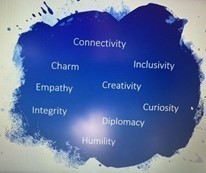When organising events, things often fall into a pattern. We have the tick list of venue checks, timelines for communication and constructing the programme. In 2020, everything was prepped for the UK Knowledge Mobilisation Forum in March, and only weeks before Covid-19 forced the organisers to cancel the event. Like so many committees, we had no idea what the future would hold. By summer 2020, we knew we wanted to hold the Forum and that online was our safest option.
The Forum is true to its name: a forum, not a conference. It is a chance to mobilise knowledge with others in the field. It has a national following yet attracts an international audience, connecting researchers, practitioners, students, and professors across all sectors. Alongside mobilising knowledge, sustainability is at the heart of the organising group:
• we make enough money to cover costs and make generous donations to nominated charities
• we promote social & environmental sustainability and
• run wholly with volunteers and goodwill.
It’s a little bit eclectic and homespun, but this supports creativity.
Our first step was to revisit our programme plans from 2020. We knew, somewhat ironically, home working often means less chance to escape work. It can also be more difficult to justify a full day away from the day job, so we opted to spread the Forum over a week as a daily lunchtime activity. We didn’t want to assume everyone could attend every day, so we lowered our usual fee (after all we didn’t need to provide food, venue, travel or hotel costs). Our only expenses were fees for Zoom subscription and Eventbrite.
We agreed on 100 tickets and sold them all. Sticking to this number helped to make interactions manageable. We chose not to record anything to avoid distracting from discussions and administrative burdens on the organising group. The experience was about networking, connecting and sharing.
We chose Zoom as our main platform as we felt it was familiar to most people (the organisers have used Zoom for years to meet virtually as we’re spread across the country). Next, we reviewed our format to ensure interactivity:
• Keynote presenters created opportunities for input from the audience, so that worked well
• Posters sessions needed to be more than a viewing gallery, so we shared PDFs via GoogleDrive to enable comments to be posted in advance of 20-minute interview-based session with each presenter. This worked really well, generating dynamic and insightful discussion.
• Workshops – used Zoom and we left workshop hosts to build in activities. We asked participants to sign up to workshops via GoogleDocs in advance.
• Knowledge Fayres - offered small group activities via Zoom break out rooms, with room hosts rotating every 15 minutes. Chaotic, but lots of fun!
• Knowledge Wall, created using Padlet, contained fun questions to break the ice and get contributions flowing. There was plenty of post-session sharing of resources and experience.
• To create networking opportunities:
o We opened each session 30 minutes early for some group chat
o A WhatsApp group was available for attendees to connect and share (which is still open)
o we held two virtual coffee afternoon drop-ins and a randomised coffee trial

We hosted the programme and all joining instructions on a WordPress page, accessible via a password protected area to participants only.
So, how did it go? Our choice of online platforms worked seamlessly and provided ample ways for all participants to engage. Presenters enhanced this by introducing other online tools such as JamBoard. Attendees were invited to share reflections and learning via their own blogs, with a selection added to the UKKMb website. Attendance was high (and reached, Canada and New Zealand!), feedback (via GoogleForms) was glowing, and the quality of input and sharing was excellent.

The keynote presenters’ book-ended the week with great sessions on the skills required for a good knowledge mobiliser, and the use of storytelling and liminal spaces for knowledge sharing in the workplace. As librarians this really resonated with us!
From my (SS) organisational perspective some of the learning has already implemented in supporting an inter-organisation emergency planning activity, it has supported work on a new liminal space for staff in the organisation and is putting some current research into practice around management of long term conditions.
For me (SW) a workshop on ‘what works in knowledge mobilisation’ highlighted that despite challenges in evaluating knowledge-based activities, we are increasingly able to demonstrate our contributions. In the poster session, a discussion on how knowledge mobilisers should use imposter syndrome to their advantage, reflected the feelings of many in the audience.
From the organising group perspective, reflecting on what it’s possible to deliver online, (sustainably, for low cost and from a group who hadn’t met in person for more than two years - or ever for some!) a virtual high-five over a post-forum gin summed it up.
From our personal perspectives it has been a tough year for all the committee members, but it’s an amazingly supportive group and the Forum helped everyone to re-energise and reminded us what we love about this work. We’re already looking forward to the next one, we might even get to meet our fellow organisers in the flesh!
Suzanne Wilson
Head of Library and Knowledge Services
Cumbria, Northumberland, Tyne and Wear NHS Foundation Trust
suzanne.wilson@cntw.nhs.uk
Susan Smith
Library Manager
Mid Cheshire Hospitals NHS Foundation Trust
susan.smith2@mcht.nhs.uk
(two members of the organising committee for UKKMb)

